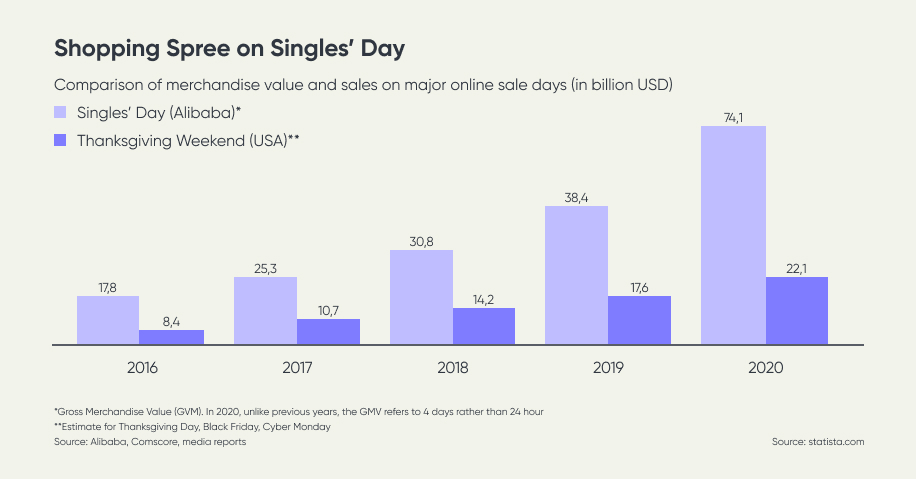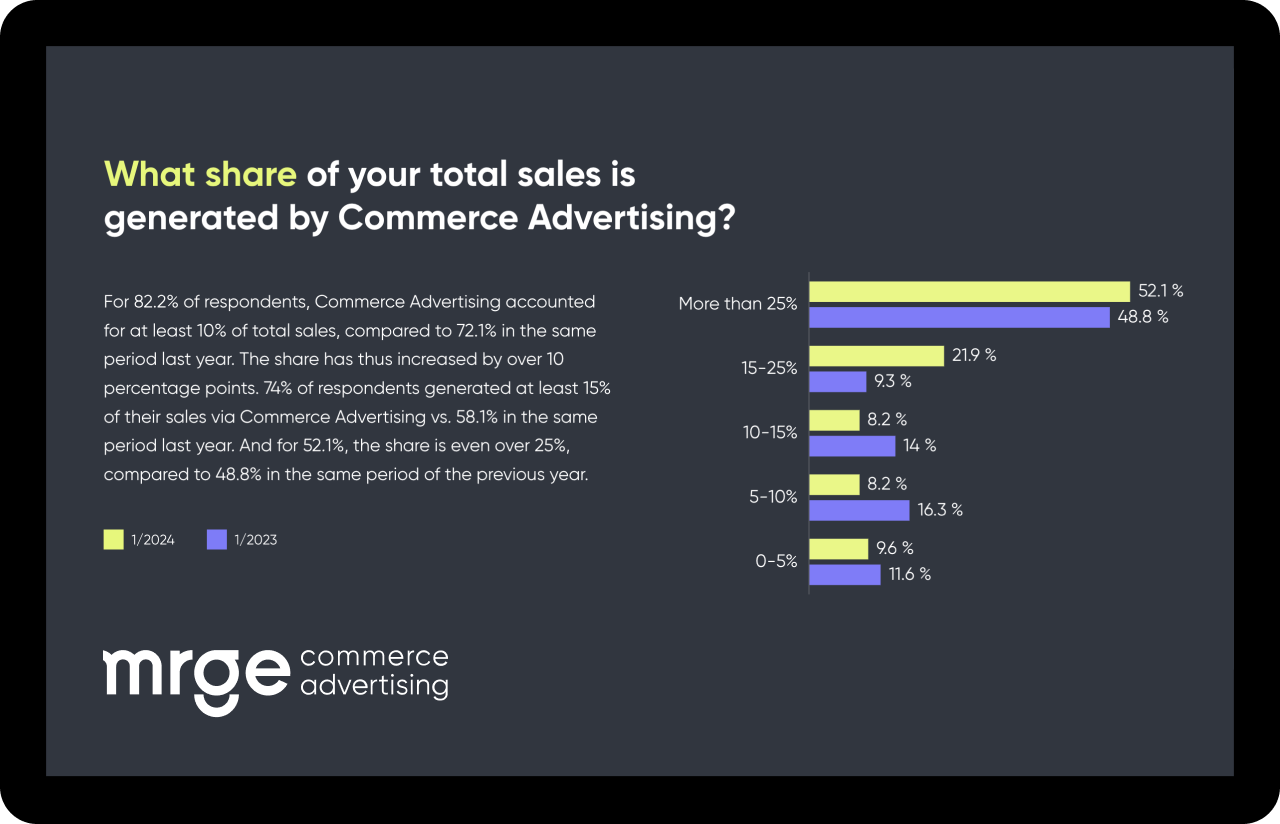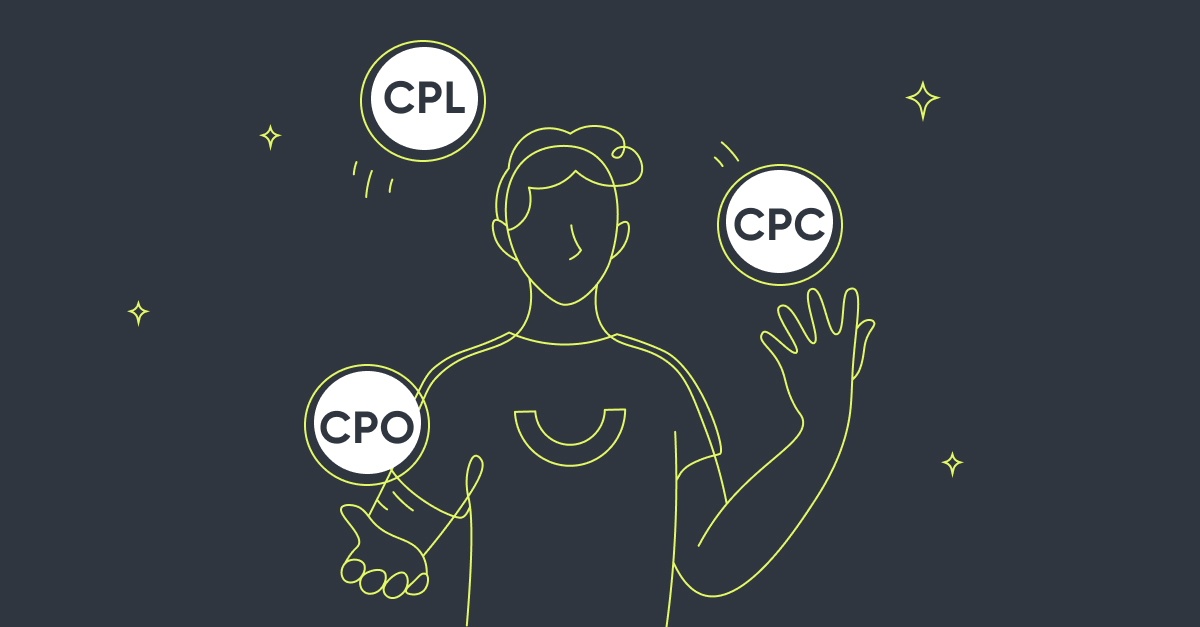Black Friday and Cyber Monday are no longer limited to the USA. These e-commerce events have become established and now mark the start of holiday shopping worldwide. Singles’ Day is also becoming more widespread. With the following tips, advertisers and publishers can optimally prepare for the “discount battle” – and ensure increasing sales.
Key Take Aways
Executive summary: 5 key take-aways for quick readers
- In 2021, Black Friday and Cyber Monday sales amounted to EUR 5.3 billion in Germany.
- Online marketplaces such as Amazon are the strongest in terms of sales.
- In addition to Black Friday and Cyber Monday, Singles’ Day (November 11) is establishing itself as a major shopping event.
- Advertisers and publishers should start planning as early as August.
- Exclusive Cyber Week deals are a win-win situation for both sides.
Cyber Week: history, relevance, and sales
Towards the end of the year, when Christmas shopping begins for many online buyers, three major events have become increasingly popular. The first is Singles’ Day, which is only just arriving in Europe. This “holiday” originates in China and takes place annually on 11/11. Originally intended as a day for young singles to attend parties and make friends, Singles’ Day is now China’s biggest online shopping day. Alibaba Group, for example, reported sales of USD 74.1 billion on 11/11/2020 – that’s three times more than Black Friday and Cyber Monday sales in the US. In Europe, too, more and more online retailers are taking part in Singles’ Day and advertising numerous discount promotions.

The next big shopping event is Black Friday. It originated in the American retail sector and takes place on the Friday after Thanksgiving (which is the fourth Thursday in November). Many Americans take the day to go Christmas shopping, so many retailers offer special promotions and discounts. With the growth of e-commerce, Black Friday has also become an online event and spread beyond the USA. Today, the shopping event is so popular and lucrative that many stores organize an entire “Black Week” and entice shoppers with a range of daily offers and discounts.
Black Week is followed directly by Cyber Monday on the Monday after Thanksgiving. Cyber Monday was originally the online counterpart to Black Friday, which mainly takes place in brick-and-mortar stores. Although Black Friday is now also a strong sales driver in e-commerce, Cyber Monday in the USA is still ahead in terms of online sales. The shopping days around Black Friday and Cyber Monday are also often referred to as Cyber Week.According to a study by Sirius Campus, 2021 sales on Black Friday and Cyber Monday in Germany amounted to EUR 5.3 billion. Of this amount, 42 percent was generated by online mail-order companies, 37 percent by direct purchases from the manufacturer, and 21 percent by brick-and-mortar retailers. The top product categories during Cyber Week include fashion, electronics, and beauty.
Attention, advertisers! 5 pro tips for Black Friday and Cyber Monday
For advertisers, Cyber Week is one of the most crucial times of the year. It heralds the start of the holiday shopping season and offers the opportunity to significantly increase annual sales before year’s end. Follow these tips to be well-prepared:
1. Start planning early
In August, or earlier, Advertisers should start preparing for Black Friday and Cyber Monday. At this point, the marketing budget for Cyber Week and its distribution across the various channels should be set. In addition, their own online store should be tested and examined for optimization potential so that everything runs smoothly for customers: from product search to checkout. When it comes to planning specific campaigns, advertisers should definitely use the previous year’s figures as a basis for planning.
2. Partner management
Based on the figures from last year’s Cyber Week, and the previous months, advertisers can easily determine which publishers they have been able to work with most successfully. As soon as the promotions for the upcoming Cyber Week are scheduled, publishers should be informed about them so that they can prepare suitable content.
3. Target customers in the right places
In order to target promotions around Black Friday and Cyber Monday, advertisers need to know where – on which platforms and websites – their target audience can be found. A high-fashion magazine may be a glamorous environment, but that’s not where smart shoppers usually look for discounts and coupons.
4. Be honest
Some retailers like to raise their prices in the run-up to Cyber Week and then lower them to the original price during Black Friday and Cyber Monday, thus offering supposedly lucrative discounts. However, online shoppers quickly detect such window dressing. More and more users are using price monitoring tools to keep a close eye on developments.
5. Prepare for the rush
When Cyber Week finally arrives, all the business units involved must be prepared for the onslaught of visitors. Sufficient server capacity must be available so that the store can cope with the high traffic volumes. Customer service should be staffed up, and merchandise management and logistics should be attended to, as well. After Cyber Week, capacities for returns management should also be ramped up.
Get ready, publishers! 5 pro tips for Black Friday and Cyber Monday
Cyber Week is an important time for publishers to further monetize their content by earning more commissions. Here’s what publishers should keep in mind:
1. Start planning early
In August, if possible, publishers should begin to plan the upcoming Cyber Week. First and foremost, this means content planning. Publishers should focus on creating content based on their SEO capabilities, or optimizing existing content, to increase their findability in search engines.
2. Identify audience needs
Even if other sectors try to tempt publishers with higher commissions and sales, you should remember the needs of their core target group and produce appropriate content that can then be monetized. If you suddenly address completely different topics during Cyber Week simply to grab commissions, you will alienate your core audience and possibly lose revenue in the long run.
3. Pay attention to the sale dates of advertisers
Which promotions and discounts take place on which days? This varies from advertiser to advertiser. While some offer discounts and bargains throughout Black Week, others limit themselves exclusively to Black Friday, or the four days from Black Friday to Cyber Monday. Publishers should be aware of these schedules and plan their content accordingly.
4. Celebrate Cyber Week
Many online shoppers look forward to Cyber Week all year long. Publishers should fuel this anticipation on their social media channels in advance of Black Friday and Cyber Monday. Gift guides and discount lists are ideal content types for this time period.
5. Negotiate exclusive deals
In the run-up to Cyber Week, publishers should determine which advertisers they have been able to work with most successfully. It makes sense to contact these advertisers early on to exchange information about planned campaigns and content – in order to negotiate exclusive deals for your own audience.



















